ADDICTION
ALCOHOL DEPENDENCE
QUIT SMOKING
ALLERGY
ANTI FUNGAL
FUNGAL INFECTION
FUNGAL NAIL INFECTIONS
ANTI-REJECTION DRUGS
ANTI WORM
ANTIBIOTIC
BACTERIAL INFECTIONS
ARTHRITIS
GOUT
OSTEOARTHRITIS
RHEUMATOID ARTHRITIS
BLOOD
LOW PLATELET COUNT
THROMBOPHLEBITIS
VARICOSE VEINS
COLON
ANAL FISSURE
PILES
ULCERATIVE COLITIS
DIABETES CARE
DIABETES INSIPIDUS
DIABETES TYPE
DIABETIC FOOT ULCERS
GLUCOSE MONITOR
EYES/EAR CARE
DRY EYES
EYE CARE
EYE EXAMINATION
EYE INFECTION
EYE LASHES
EYE PAIN
GLAUCOMA
OCULAR HYPERTENSION
UVEITIS
FEVER CARE
MALARIA
RHEUMATIC FEVER
TYPHOID FEVER
GASTROINTESTINAL
ACIDITY
CONSTIPATION
CROHN'S DISEASE
DIARRHOEA
GALLBLADDER STONES
INTESTINAL ULCERS
IRRITABLE BOWEL SYNDROME
MOTION SICKNESS
NAUSEA
Prograf 0.5 mg (Tacrolimus)
| Active Ingredient (Generic Name): | Tacrolimus |
|---|---|
| Indication: | Anti Rejection Drugs |
| Manufacturer: | Astellas Pharma India |
| Packaging: | 10 capsules in one strip |
| Strength: | 0.5 mg |
From: $33.00
You have been prescribed Prograf 0.5 mg, an immunosuppressant medication containing Tacrolimus. It is utilized to prevent organ rejection following transplantation and to treat severe skin conditions such as eczema. The medication functions by binding to a specific protein, inhibiting interleukin-2 production, and decreasing immune system reactivity. Your healthcare provider may recommend it for organ rejection prevention, eczema treatment, or for other skin conditions off-label. Take the medication as instructed, splitting the dosage into two and regularly monitoring blood levels. Exercise caution regarding potential side effects, interactions, and precautions. It is important to further research and understand the benefits and risks of Prograf in your particular case.
Main Points
- Prograf 0.5 mg (Tacrolimus) is prescribed as an immunosuppressant for preventing organ rejection post-transplant and managing severe skin conditions such as eczema.
- The initial dosage typically ranges from 0.2-0.3 mg/kg/day, divided into two doses, with regular monitoring of blood levels being essential for safe use.
- Common side effects may include stomach pain, diarrhea, nausea, and mild skin problems, while rare but severe side effects could involve increased infection risk and potential lymphoma development.
- Prograf 0.5 mg may interact with antifungals, macrolide antibiotics, and HIV protease inhibitors, emphasizing the need to disclose all medications to healthcare providers.
- Storage and disposal guidelines recommend keeping the medication away from light, children, and pets, and proper disposal of unused or expired capsules.
What Is Prograf 0.5 mg?
Prograf 0.5 mg is a medication containing tacrolimus, used to prevent rejection in patients who have had organ transplants, such as kidney, liver, and heart transplants. This immunosuppressive drug helps to inhibit the body’s immune response to foreign substances, reducing the risk of organ rejection after transplantation. It is typically prescribed alongside other immunosuppressive medications for optimal effectiveness. Patients are advised to take Prograf 0.5 mg orally twice daily at consistent times as directed by their healthcare provider to ensure the success of the transplant. Adhering to the prescribed regimen is crucial for a positive transplant outcome.
How Does Tacrolimus Work?
When tacrolimus is ingested, it binds to the FKBP-12 protein, preventing the activation of T-cells, a type of immune cell responsible for organ rejection. By inhibiting T-cell activation, tacrolimus hinders the immune response against the transplanted organ. This is achieved by blocking the production of interleukin-2 (IL-2), a cytokine that triggers T-cell activity. With IL-2 suppressed, T-cells remain inactive, safeguarding the transplanted organ from immune attack.
Tacrolimus also hampers the production of other cytokines like interferon-gamma and tumor necrosis factor-alpha, which play roles in immune responses. By reducing the immune system’s reactivity, tacrolimus enables the transplanted organ to operate normally, enhancing the likelihood of a successful transplant.
Indications and Uses
Tacrolimus is primarily prescribed to prevent organ rejection in patients who have undergone kidney, liver, or heart transplants. It may also be used to treat severe skin conditions like eczema and psoriasis. Tacrolimus is commonly used in combination with other immunosuppressants to reduce the risk of rejection in transplanted organs. In addition to transplantation, tacrolimus is sometimes used off-label to manage conditions such as atopic dermatitis, vitiligo, and psoriasis that have not responded to standard treatments. While not FDA-approved for these purposes, tacrolimus may also be considered for conditions like Crohn’s disease or ulcerative colitis. It is important to consult with your healthcare provider to determine the suitability of tacrolimus for your specific medical needs.
Dosage and Administration
For optimal therapeutic outcomes, adhere closely to the prescribed dosage and administration instructions for tacrolimus. Failure to do so may result in ineffective treatment or heightened risk of adverse reactions.
The typical initial dose for Prograf 0.5 mg ranges from 0.2-0.3 mg/kg/day, divided into two doses. However, dosage adjustments may be necessary based on individual medical requirements and treatment response. Regular monitoring of blood levels is crucial to maintain therapeutic efficacy.
| Dosage Form | Strength | Frequency |
|---|---|---|
| Capsule | 0.5 mg | Twice daily |
| Injection | 5 mg/mL | Once daily |
| Granules | 0.2 mg/mL | Twice daily |
Adhere to the administration guidelines when using Prograf to mitigate potential adverse effects. Take the medication at the same time each day, with or without food, and do not crush or chew the capsules. In case of a missed dose, take it promptly without doubling up. Consult with your healthcare provider or pharmacist for any necessary dose adjustments or concerns.
Mechanism of Action
Prograf 0.5 mg suppresses your immune system’s ability to recognize and respond to foreign substances by inhibiting the production and release of lymphokines, which are essential for T-lymphocyte activation. This helps prevent rejection of a transplanted organ. When you take Prograf 0.5 mg, it binds to FKBP-12 protein in your immune cells, forming a complex that interacts with calcineurin, a crucial enzyme in T-cell activation. By inhibiting calcineurin, Prograf 0.5 mg blocks the dephosphorylation of NF-AT transcription factor, necessary for genes involved in T-cell activation. This reduction in immune response allows the transplanted organ to survive, highlighting the role of Prograf 0.5 mg in maintaining organ function.
Benefits of Prograf 0.5 mg
Prograf 0.5 mg effectively manages organ transplant rejection by providing strong immunosuppressive effects. It helps prevent the body from rejecting the new organ, reducing the risk of acute rejection episodes and improving graft function and survival rates. Prograf 0.5 mg also lowers the incidence of chronic rejection, enhancing the quality of life for transplant patients. Additionally, it is an effective treatment for refractory rejection, offering a second chance for graft survival. Trust Prograf 0.5 mg for reliable and successful management of organ transplant rejection.
Common Side Effects
When starting Prograf 0.5 mg, you may experience common side effects like stomach pain, diarrhea, or nausea. These gastrointestinal reactions may disrupt your daily routine. You may also notice mild skin issues, effects on the nervous system, and other potential reactions.
Gastrointestinal Reactions
Gastrointestinal reactions are commonly reported with Prograf use, including stomach pain, diarrhea, and nausea. These side effects are typically mild to moderate and may diminish as your body adapts to the medication. It is important to monitor symptoms and promptly report any severe or persistent gastrointestinal issues to your healthcare provider.
| Gastrointestinal Reaction | Frequency || Stomach pain | 15% to 30% of patients || Diarrhea | 10% to 20% of patients || Nausea | 5% to 15% of patients |
In rare instances, Prograf may lead to more serious gastrointestinal reactions like gastrointestinal perforation, necessitating immediate medical attention. If you experience symptoms such as severe abdominal pain, vomiting blood, or black tarry stools, seek urgent medical help. Your doctor may adjust your dosage or suggest alternative medications to alleviate gastrointestinal side effects.
Mild Skin Issues
Skin issues like acne, pruritus, and rash are common side effects of Prograf, which you may experience while managing gastrointestinal reactions. These issues can present as redness, itching, or small pimples on the skin. Mild rash or hives may also occur, causing discomfort but usually not severe.
Monitoring your skin closely and informing your doctor of any changes is important. Typically, mild skin issues resolve without intervention, but your doctor may suggest topical treatments to ease symptoms. In cases of severe reactions like blisters, peeling skin, or widespread rashes, immediate medical attention is necessary.
Maintaining good hygiene, such as regular skin cleansing and avoiding harsh soaps or tight clothing, is recommended. Being proactive in caring for your skin can help minimize the impact of these mild issues on your daily routine.
Nervous System Effects
Nervous system effects like tremors, headaches, and insomnia are common when taking Prograf. These side effects can be bothersome and impact daily activities. It is essential to monitor your body’s response to the medication and inform your doctor of any changes.
Possible nervous system effects of Prograf include:
- Tremors: Shaking or trembling in the hands, arms, or legs, affecting normal tasks.
- Headaches: Mild to moderate headaches that may respond to over-the-counter pain relievers.
- Insomnia: Difficulty falling asleep or staying asleep, leading to tiredness and reduced productivity.
Discuss any nervous system effects with your doctor to consider dosage adjustments or additional medications for symptom management. Being aware of these potential effects can help you proactively address them for a better treatment experience.
Serious Side Effects and Warnings
Serious side effects of Prograf 0.5 mg can be life-threatening, particularly for individuals with a weakened immune system or those taking immunosuppressant medications. These may include an increased susceptibility to infections, lymphoma, and skin cancer. Nephrotoxicity, leading to kidney damage and potential failure, is also a risk. Another serious condition to be aware of is posterior reversible encephalopathy syndrome (PRES) affecting the brain. Additionally, there is a risk of hyperkalemia, a condition where high potassium levels can result in cardiac arrest. If you notice symptoms such as fever, chills, or mental status changes, seek immediate medical attention. It’s crucial to carefully consider the benefits of Prograf 0.5 mg compared to the potential severe side effects.
Interactions With Other Medications
Informing your doctor about all prescription and over-the-counter drugs you’re taking is crucial to avoid potential interactions with Prograf 0.5 mg. Certain medications can affect the way your body processes tacrolimus, either increasing its toxicity or reducing its effectiveness.
Medications that may interact with Prograf 0.5 mg include antifungals like ketoconazole, itraconazole, and fluconazole, macrolide antibiotics such as erythromycin and clarithromycin, and HIV protease inhibitors like ritonavir and indinavir. Discussing your medication regimen with your doctor is essential to ensure safe and effective treatment with Prograf 0.5 mg.
Precautions and Contraindications
When taking Prograf 0.5 mg (Tacrolimus), it is important to consider certain precautions and contraindications for your safety. Be aware of potential allergic reactions, which can be severe, and evaluate the risks versus benefits if you are pregnant or breastfeeding. Also, exercise caution regarding possible drug interactions that may affect the effectiveness of your treatment.
Allergic Reactions Warning
It is crucial to closely monitor your body’s response to Prograf 0.5 mg due to the potential for severe and life-threatening allergic reactions. Familiarize yourself with the signs and symptoms of an allergic reaction, and promptly seek medical help if any of the following occur:
- Hives, itching, or rash
- Swelling of the face, lips, tongue, or throat
- Difficulty breathing or swallowing.
Pregnancy and Breastfeeding
When starting Prograf 0.5 mg, it’s crucial to understand the potential risks and benefits of tacrolimus use during pregnancy and breastfeeding, particularly for women of childbearing age or those currently nursing. Limited human data is available regarding the use of tacrolimus during pregnancy, but animal studies suggest an increased risk of fetal harm. If you are pregnant or planning to conceive, it is important to consult your doctor about the advantages and drawbacks of using Prograf 0.5 mg.
Tacrolimus is excreted in breast milk, and the effects on a nursing infant are not well understood. Due to the potential for severe adverse reactions in the infant, careful consideration should be given to whether to continue nursing or Prograf 0.5 mg therapy. The decision should be based on weighing the benefits of breastfeeding against the potential risks of tacrolimus exposure to the infant, with guidance from your doctor to make an informed choice based on your specific circumstances.
Drug Interactions Alert
It is essential to discuss all your current medications with your doctor when using Prograf 0.5 mg to avoid adverse reactions due to potential severe interactions. Inform your doctor about all prescription and over-the-counter medications, vitamins, and supplements you are taking, as some may interact with Prograf 0.5 mg.
Certain medications can affect the levels of tacrolimus in your blood, either increasing or decreasing its concentration. Be cautious when combining Prograf 0.5 mg with:
- Cyclosporine
- Rifampin
- Antifungal medications like ketoconazole
Your doctor may need to adjust your medication regimen or closely monitor you for potential interactions. If you have any concerns about how Prograf 0.5 mg may interact with other medications, do not hesitate to discuss this with your doctor.
Proper Storage and Disposal
Store Prograf 0.5 mg (Tacrolimus) in its original packaging at a temperature range of 15?C to 30?C (59?F to 86?F) to maintain its effectiveness. Keep it away from light, children, and pets. Dispose of any unused or expired capsules properly. Do not flush them down the toilet or throw them in the trash. Contact your pharmacist or local authorities for guidance on a take-back program or designated collection facility to prevent environmental harm. Always check the expiration date and consult your healthcare provider if unsure about storage or disposal methods.
Overdose Symptoms and Treatment
An overdose of Prograf 0.5 mg (Tacrolimus) can result in severe symptoms such as nausea, vomiting, diarrhea, and abdominal pain. Quick medical attention is essential in case of an overdose to minimize the risk of complications, including kidney damage. Treatment may involve the administration of activated charcoal to absorb the toxin and supportive care to manage symptoms. In serious cases, hospitalization may be required for monitoring and treatment of life-threatening symptoms. Seeking immediate medical help is crucial to prevent long-term harm.
Patient Reviews and Testimonials
Transplant patients have shared diverse experiences with Prograf 0.5 mg (Tacrolimus), noting varying success in managing their condition. Some have reported improvements in health, including reduced rejection rates and enhanced graft function. Conversely, others have encountered adverse reactions like tremors, headaches, or gastrointestinal issues. Individual responses to Prograf 0.5 mg can differ.
Patient testimonials commonly highlight the medication’s effectiveness in preventing organ rejection, with some mentioning concerns about potential side effects. Reviews may emphasize the importance of regular blood tests to monitor tacrolimus levels for optimal efficacy and safety.
Each person’s encounter with Prograf 0.5 mg is unique, underscoring the need to consult a healthcare provider to tailor treatment to individual needs. Discussing the benefits and risks of Prograf 0.5 mg with a healthcare professional enables informed decision-making for optimal treatment outcomes.
Frequently Asked Questions
Can I Take Prograf 0.5 mg if I’m Pregnant or Breastfeeding?
During pregnancy or while breastfeeding, it is important to be cautious with medications. It is essential to consult your healthcare provider before taking any medication, especially immunosuppressants like Prograf 0.5 mg. It is not recommended to take Prograf 0.5 mg if you are pregnant or breastfeeding without the approval of your doctor. Tacrolimus, the active ingredient in Prograf, may impact fetal development or be present in breast milk. Your healthcare provider will assess the benefits and potential risks before making a decision regarding the use of this medication.
Can I Drink Alcohol While Taking Prograf 0.5 mg?
When taking immunosuppressive medications like Prograf 0.5 mg, it is advisable to limit or avoid consuming alcohol. Alcohol can potentially interact with the medication, leading to an increased risk of side effects or a reduction in its effectiveness. For personalized advice on alcohol consumption while on Prograf 0.5 mg, it is recommended to consult your doctor or pharmacist.
How Long Does It Take to See the Effects of Prograf 0.5 mg?
The effects of Prograf 0.5 mg typically start to show within 1-2 weeks of starting the medication. It may take 6-12 weeks to experience the full benefits as the drug needs time to build up in your system and suppress your immune response. Individual responses may vary, so your doctor will monitor your progress closely and adjust your dosage as necessary.
Can I Stop Taking Prograf 0.5 mg Abruptly if I Feel Better?
Before discontinuing Prograf 0.5 mg, it is essential to consult your healthcare provider. Suddenly stopping immunosuppressive medication like Prograf 0.5 mg can result in serious consequences such as organ rejection. Even if you are feeling better, it does not necessarily mean that the underlying condition has been resolved. Your doctor will assist you in gradually reducing the dosage to minimize potential risks. It is crucial not to halt taking Prograf 0.5 mg without their guidance to ensure your well-being.
Is Prograf 0.5 mg Available in Different Strengths or Forms?
Yes, Prograf 0.5 mg is available in different strengths and forms. Various medications, including Prograf, come in different strengths and forms such as capsules, tablets, and injectables. This flexibility allows patients to work with their healthcare providers to determine the most suitable dose and form for their individual needs.
Conclusion
You have been prescribed Prograf 0.5 mg, an immunosuppressant medication. You are familiar with its mechanism of action, indications, and precautions. It is important to follow the dosage instructions, store the medication properly, and seek medical help in case of an overdose. Regular check-ups and monitoring of your progress are essential for a successful outcome. Report any side effects promptly and adhere to the treatment plan as directed by your healthcare provider. Prograf 0.5 mg can support your transplant process when managed carefully.


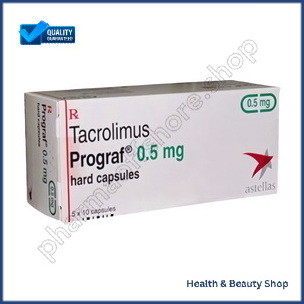
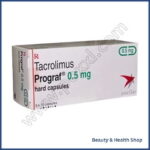

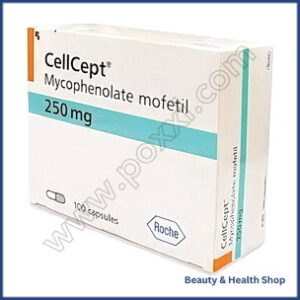
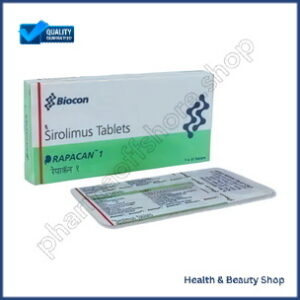
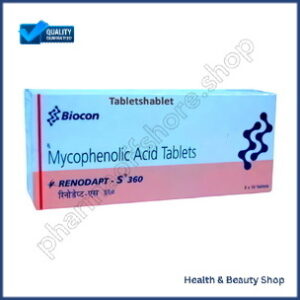
There are no reviews yet.